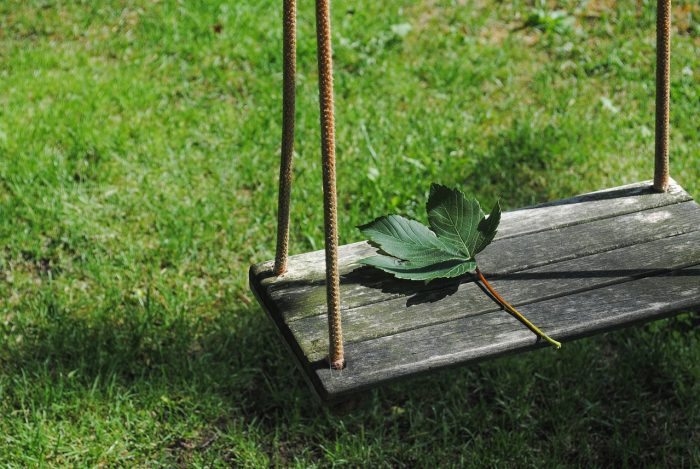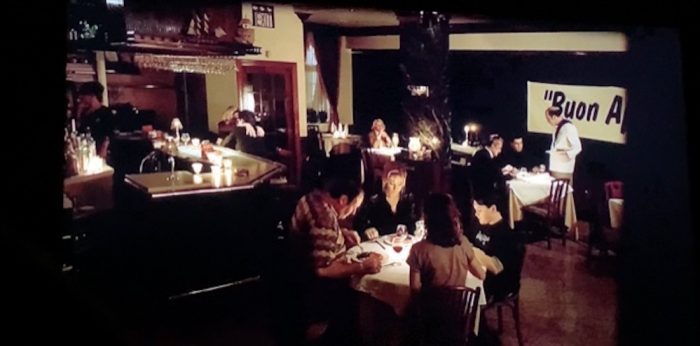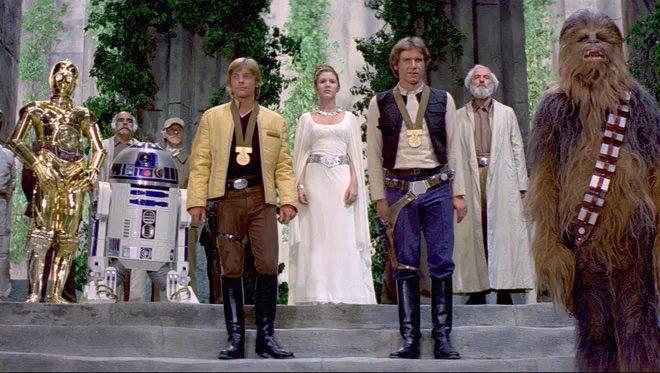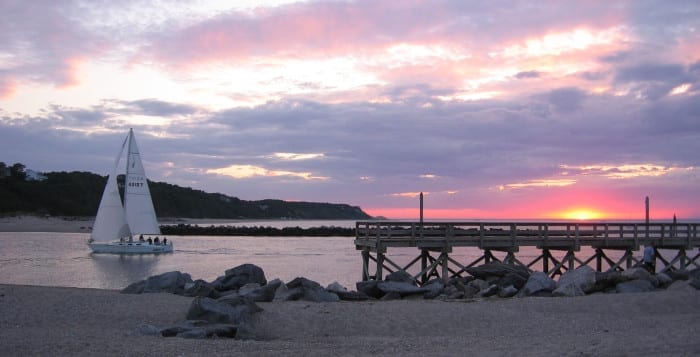By Madeleine Emilia Borg
I have a very hard time saying goodbye. It becomes particularly apparent when something that has been there your whole life as a constant reminder that things are as they should be, suddenly one day is snatched away from you. Somewhere I have known that it can’t always go on this way. That this will also have to come to an end. Still, once it occurs, it is no less devastating.
It’s truly amazing to have had a place to return during the summertime. Loving arms that have welcomed me and a bed to sleep in, its worn lace spread getting thrown off every single night because of the nearly unbearable heat. And as soon as I had the light on, all the bugs ended up in the book I was reading. Almost always that book was borrowed from the Port Jefferson Free Library. Despite the various little critters, I would never trade those nights and days for anything in the world.
The Beach House, hidden away in Miller Place, Long Island and the people I’ve shared my experiences with there own a piece of my heart. With its typical northeastern faded gray shingles, the black roof one can crawl onto out of almost every room upstairs and the dreamy view all the way to Connecticut, where the fire works during Fourth of July light up the horizon as if it is burning. And for the first time in my life I won’t be able to visit it again. Because sometimes even old houses at New York’s end that have served as second homes must be emptied of all memories and sold to another family who can harvest the same pleasures and joys from it as much as its past cherishing owners.
The winding gravel path up from the road where the trash cabinet stands, its carved out blue whales on both doors and the sign in the tree with the black painted letters “Henry’s Place”, indicating that a home lurks beyond all the overgrown lush greenery.
The barefoot schlepp from the splintery board walk bridge up the steep slope, when the soles of our feet are numb after stepping around on tiny rocks laid scattered all over the dazzling white beach, but which we’ve always called pebbles and therefore they feel somewhat kinder than ordinary stone.
The outdoor shower that stills smells so much of cedar wood and security although it is over 23 years old. When I let the tepid water sprinkle down over my sun flushed shoulders it doesn’t hurt even a bit.
Below the hill where the magnificent deer family usually observes us through the screen window in the kitchen as we prepare for dinner making a salad. Slicing satiny tomatoes, chopping onions and carving out avocados that we’ve carefully selected at Jimmy’s down the road. He always sneaks butterscotch and sour watermelon lollipops into the grocery bags.
Having trouble falling asleep and the feeling of time standing completely still, while impatiently awaiting the next morning when I’ll hear the much anticipated sound of car doors opening and the rest of my favorite people. Uncles and aunts and cousins I call siblings will come up the driveway with smiles bigger than their faces. We’ll be racing down the stairs, the aching stir pounding under my rib cage.
Freshly caught seven-dollar lobsters from the little fish store that Nana brings in brown paper bags, the ones we dip into melted butter for our own version of a Swedish crayfish party. My cousins and I squeal from the carpet stairs in enchantment mingled with terror as we sit and watch how she puts them in the big black boiling pot, one by one. Afterwards my brother throws the remains to the seagulls after we gingerly go down to the water and rinse off. He really should get into baseball, someone says and we stop and grill marshmallows until we need to find our way back with a flashlight.
When my younger cousin and I as eight- and 10-year-olds invade our grandparent’s closets, smear on all the makeup we can find, attach the loose fitting garments with sparkly hair clips and wobble down the long stairs in way too high heels, feeling them slightly chafe but it doesn’t really matter because we hear everyone clapping and cheering us on from below.
Thirty-one years ago, my family purchased a beach home in Miller Place. It became a haven and gathering place for three generations of families and friends. It was a place of endless parties, a place for recuperation and healing. Located on four acres of land plus beachfront property, with unobstructed views of the Long Island Sound, it was truly a place of sanctuary back in the day, when Miller Place was full of sod fields, not strip malls and homes … but people get old, families and friends drift apart and life takes us all on different paths. Very sad to have given it up … but sometimes letting go breathes new life into all. My 21-year-old niece, Madeleine, who grew up in Sweden, spent the last 18 summers at the beach house with us. These are her memories. — Paul Singman
Early, calm crossword puzzle breakfasts with Poppy on the porch when the air is still clean and pure, only a few motor boat’s distant soothing hum. I make a sesame bagel with salmon and cream cheese, he opts for a bowl of cereal. And so we sit and listen to exactly nothing and just enjoy each other’s presence.
The few bright blue hydrangea bushes that survived the fire we never mention, where I pass the house next door and the contrasting reality looming between the bamboo shoots. Nana planted new ones adjacent to the facade later on, which quickly morphed into something jungle-like. It just grows bigger every year.
The attic holding Mom’s poufy wedding dress, a sandbox shaped like a giant turtle, my great uncle’s trumpet played in grand symphony orchestras, black and white photographs neatly tucked into worn heavy albums with burgundy spines and travel diaries from the sixties.
The huge and frayed weather polished log which fits my little brother and I perfectly in our daily occupations of playing shop and bakery, or reclining on each of its curved sides while trying not to spill our Animal Crackers and cheese sticks in the sand. Nana comes over sometimes to buy a lemon meringue pie and some rolls, or she’s looking for a new gown she can wear to the imaginary ball that very evening. We always have something just right to offer.
During an unusually dramatic and moist storm, the outdoor furniture with blue and white striped cushions blowing off along the corner of the house, lightning strikes down the chimney and dances for a few seconds over the glossy parquet living room floor.
Lazy evenings after a shower when my mother wraps me in a fluffy bathrobe and I clamber up on Nana’s unusually high raised bed. Stacked over bricks overlooking the complete paradise we find ourselves in, we start reading in the mellow comfort of each other’s camaraderie. My best friend. Earlier I left a note that ceremoniously invited her to this particular activity and would like it to continue forever.
The squirrel that gets in through a broken screen at the height of a pine tree, running across the fireplace, leaving adorable sooty paw prints in the sink and in the light purple bathtub which always tends to be filled with foam of lavender and violets, fittingly enough.
The dusty ceiling fan I stand straight beneath, closing my eyes just to breathe in the familiar salt breeze and coconut scent of Coppertone sunscreen which we continue to use even though all of us have grown up, even the smallest ones.
The back den with its sugary wood scent and photo collage of everyone of us from all times and places spread across the entire wall, Every time I look I see something new.
Short adventure walks that turn into running after we discover a vacant diving dock and quickly swim over only to throw oursleves in and scramble back up for hours at a time.
The wine bottle we manage to steal from the liquor cabinet and share with some we’d met the other day at McNulty’s ice cream parlor. Now sitting out among the dunes at the rotunda where we keep the umbrellas and swimming noodles I talk fervently to everyone except the person who’s mouth I’d like to graze with my own but I never dare to.
The bursting cotton candy sky, never ceasing to stun its audience, soon shifting into thick endless navy sprinkled with glowing dots. I look up at them from a swing in the sprawling storybook tree protecting a spot of the otherwise yellowed, prickly lawn. Crickets whose melodies slowly fill the night among the fireflies that we vainly try to capture in glass jars with holes in them.
The grand, annual birthday party in the middle of July that seems to get more stifling the older I get. Guests pouring in from all over the country, people I barely know but like already kiss both my cheeks and take my hand in theirs. Roaring laughter and animated gestures in a flurry of pastel cake frosting and white linen and without much blood involved, we’re still the world’s biggest family and I love each and every one of them.
And finally. The initial, delicious chills finding their way along my spine as I try not to slip getting into that remarkable ocean. All kinds of colors, textures and creatures emerge from underneath as quickly as they vanish and I’ll always be a mermaid here. Inching further in, I hear someone count to three and suddenly I’m completely underneath even though I’d demonstratively spun my hair up in a bun earlier to catch as many freckles as possible. I guess this is what heaven feels like. As I loosen the elastic from my head, I let myself float up slowly, opening my eyes to the glittering murky light and greeting a sun burning my forehead in a way that is only divine.
Goodbye beautiful house, you will be dearly missed.












